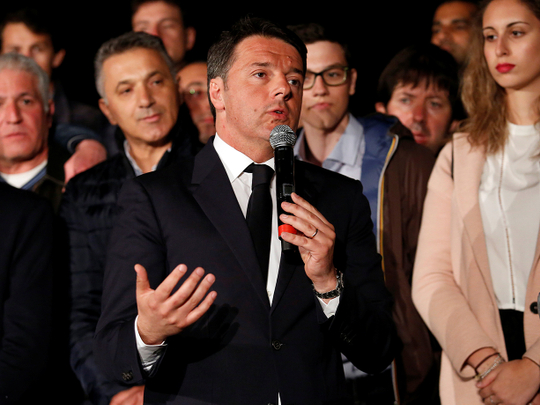
Rome: Former prime minister Matteo Renzi won the leadership of Italy’s ruling Democratic Party (PD) in a primary election Sunday, propelling him back to the forefront of the national political scene.
Renzi, 42, resigned as prime minister in December after Italians overwhelmingly rejected a constitutional referendum aimed at streamlining the parliamentary system.
Some two million people voted and Renzi himself had set the bar for success at one million voters.
Renzi’s win was announced by him and his two rivals — Justice Minister Andrea Orlando and Michele Emiliano — well ahead of the end of counting.
According to preliminary estimates, Renzi bagged 70 percent of the vote.
“It is a huge responsibility. I thank from the bottom of my heart those men and women who believe in Italy,” he tweeted.
“This is not the second half of the same match, it’s a new match,” he said in a victory speech. “This is the beginning of a completely new story.”
When he first took over the leadership in December 2013, Renzi won the backing of close on 68 percent of 2.8 million voters.
He managed to deliver significant labour market reforms and modest growth, while overseeing the granting of legal recognition to gay relationships for the first time.
But the recovery was not strong enough to pay any real political dividends, and alienated many on his party’s far left, who broke away in February to form the Progressive and Democratic Movement (DP).
Renzi then stepped down as party leader with the aim of regaining legitimacy in a future vote.
The winner of Sunday’s vote will lead the party during legislative elections slated for spring 2018, unless parliamentarians come to an agreement on electoral reforms before then and call for early elections.
During the only televised debate between Renzi and his two competitors, the former prime minister said he would do “everything to bring back energy, momentum and vigour to the country”, and railed against “stagnation that seems to be blocking political and institutional life” since the referendum.
‘Crowning of Renzi’
Lorenzo De Sio, a professor of political sociology at the Luiss University in Rome, said: “Rather than a competition, we’re looking at a process of legitimisation, a sort of crowning of Renzi as leader of the PD.”
In addition to the contrasting styles, with Orlando and Emiliano generally more reserved than the exuberant Renzi during the televised debate, the event laid bare key differences over national politics.
Renzi disagrees with his two challengers on a wealth tax, which he opposes.
If the spring election outcome requires the formation of a coalition following the legislative elections, Orlando and Emiliano have said they would seek to govern with left wing defectors or other parties on the left.
Renzi, meanwhile, has not ruled out forming an alliance with centre-right leader and former premier Silvio Berlusconi.
But on Sunday he said: “We want to have a large coalition but with citizens and associations not with the self-proclaimed parties which only represent themselves.”












